Sanation
Sanation (Polish: Sanacja, pronounced [saˈnat͡sja]) was a Polish political movement that was created in the interwar period, prior to Józef Piłsudski's May 1926 Coup d'État, and came to power in the wake of that coup. In 1928 its political activists would go on to form the Nonpartisan Bloc for Cooperation with the Government (BBWR).
| Members | |
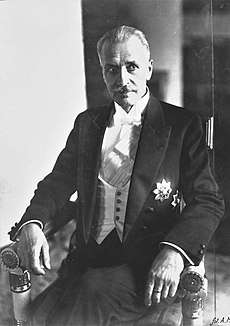 | |
 | |
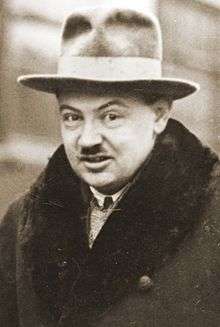 | |
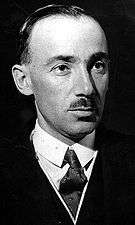 | |
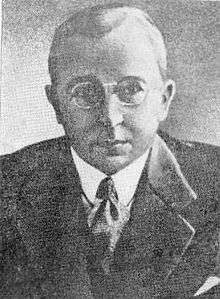 | |
Ignacy Matuszewski (pl) | |
 Bogusław Miedziński (pl) | |
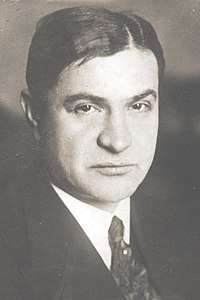 | |
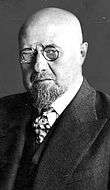 | |
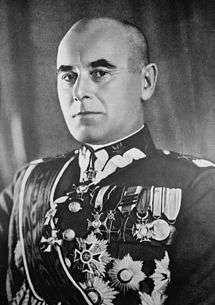 | |
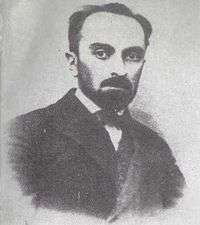 Adam Skwarczyński (pl) | |
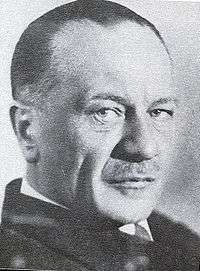 |
The Sanation movement took its name from Piłsudski's aspirations for a moral "sanation" (healing) of the Polish body politic.[1] The movement functioned integrally until his death in 1935. Following Piłsudski's death, Sanation split into several competing factions, including "the Castle" (President Ignacy Mościcki and his partisans).[2]
Sanation, which advocated authoritarian rule, rested on a circle of Piłsudski's close associates, including Walery Sławek, Aleksander Prystor, Kazimierz Świtalski, Janusz Jędrzejewicz, Adam Koc, Józef Beck, Tadeusz Hołówko, Bogusław Miedziński and Edward Rydz-Śmigły.[2] It preached the primacy of the national interest in governance, and contended against the system of parliamentary democracy.[2]
Background
Named after the Latin word for "healing" ("sanatio"),[3] the Sanation movement mainly comprised former military officers who were disgusted with the perceived corruption in Polish politics. Sanation was a coalition of rightists, leftists and centrists whose main focus was the elimination of corruption and the reduction of inflation.
Sanation appeared prior to the May 1926 Coup d'État and lasted until World War II but was never formalized. Piłsudski, though he had been the former leader of the Polish Socialist Party, had grown to disapprove of political parties, which he saw as promoting their own interests rather than supporting the state and the people. For this reason, the Sanation movement never led to the creation of a political party. Instead, in 1928 Sanation members created a Bezpartyjny Blok Współpracy z Rządem ("Nonpartisan Bloc for Cooperation with the Government"), a pro-government grouping that denied being a political party.
History
Although Piłsudski never claimed personal power, he exercised extensive influence over Polish politics after Sanation took power in 1926. For the next decade, he dominated Polish affairs as strongman of a generally popular centrist regime. Kazimierz Bartel's government and all subsequent governments were first unofficially approved by Piłsudski before they could be confirmed by the President.
In the course of pursuing "sanation", Piłsudski mixed democratic and authoritarian elements. Poland's internal stability was enhanced, while economic stagnation was ended by Eugeniusz Kwiatkowski's reforms. At the same time, the Sanation regime prosecuted communist parties (on the ostensible formal grounds that they had failed to legally register as political parties) and sought to limit the influence of opposition parties by splitting their forces.
A distinguishing feature of the regime was that, unlike the situation in most of non-democratic Europe, it never transformed itself into a full-scale dictatorship. Freedom of speech and press and political parties were never legally abolished, and opponents were usually dealt with via "unidentified perpetrators" rather than court sentences. Sanation allowed the 1928 election to be relatively free, but was dealt a setback when its supporters in the BBWR came up far short of a majority. For the 1930 election, Sanation left nothing to chance; more than 20 prominent opposition leaders were arrested and the opposition press was gagged. Under these conditions, the BBWR won over 46 percent of the vote and a large majority in both houses.
Józef Piłsudski's personal cult stemmed from his general popularity among the nation rather than from top-down propaganda; this is notable, considering Piłsudski's disdain for democracy. Sanation's ideology never went beyond populist calls to clean up the country's politics and economy; it did not occupy itself with society, as was the case with contemporary fascist regimes. From 1929, the semi-official newspaper of Sanation, and thus of the Polish government, was Gazeta Polska (the Polish Gazette).
Legislative agenda
The Sanation government invalidated the May 1930 election results by disbanding the parliament in August[4] and with increasing pressure on the opposition started a new campaign, the new elections being scheduled to November.[5] Using the anti-government demonstrations as a pretext, 20 members[4] of the opposition parties, including most of the leaders of Centrolew alliance (from the Socialists, Polish People's Party "Piast" and Polish People's Party "Wyzwolenie") were arrested[6] in September without a warrant, only on the order of Piłsudski and the then-Minister of Internal Security, Felicjan Sławoj Składkowski, accusing them of plotting an anti-government coup.[7] The opposition members (who included the former prime minister Wincenty Witos, and Wojciech Korfanty) were imprisoned in the Brest Fortress, where their trial took place (thus the popular name for the election: the 'Brest election'). A number of less known activists were arrested throughout the country.[4] They were released after the end of the election in the same month. The Brest trial ended in January 1932, with 10 accused receiving sentences up to three years of imprisonment; the appeals of 1933 confirmed the sentences. The government however gave the accused choice of emigrating: five of them took it, the other five to serve the prison term instead.[6]
In April 1935, shortly before Piłsudski's death, a new constitution (the "April Constitution") was adopted, which supported Sanation's principal ideas: a strong centralized state with a presidential system of government. Piłsudski died soon after, however, and Sanation faced some serious internal problems. Eventually it devolved into three separate movements:
- the Sanation Left (Lewica sanacyjna, formed around Walery Sławek), which sought a modus vivendi with the opposition;
- the Castle (Zamek, formed around President Ignacy Mościcki, who resided in the Warsaw Castle — hence the movement's name), which became the center; and
- the Sanation Right (Prawica sanacyjna, formed around Edward Rydz-Śmigły), which soon became virtually indistinguishable from the Camp of National Unity.
The first of these Sanation movements soon lost much of its importance, but the other two continued the ideological struggle within the country until the outbreak of war.
World War II
During the 1939 invasion of Poland, many Sanation members were taken prisoner-of-war by the Germans, while others evacuated to Romania, where they remained until war's end or were able to go on to France or Britain.
Though France insisted on excluding Sanationists from the Polish Government in Exile, many remained highly influential. During the war, Sanation members created several resistance organizations, including in 1942 the Fighting Poland Movement (Obóz Polski Walczącej) and the Convention of Independence Organizations (Konwent Organizacji Niepodległościowych), which in 1943 became subordinate to the Home Army and in 1944 merged into the Union of Independence Organizations (Zjednoczenie Organizacji Niepodległościowych).
After World War II, the Soviet-installed communist regime forced many Sanationists into permanent exile, and branded them enemies of the state.
Notable members
- Józef Beck
- Tadeusz Hołówko
- Janusz Jędrzejewicz
- Wacław Jędrzejewicz
- Adam Koc
- Leon Kozłowski
- Ignacy Matuszewski
- Bogusław Miedziński
- Ignacy Mościcki
- Bronisław Pieracki
- Józef Piłsudski
- Aleksander Prystor
- Edward Rydz-Śmigły
- Adam Skwarczyński
- Walery Sławek
- Kazimierz Świtalski
See also
- Bereza Kartuska prison
- Confederation of Independent Poland, founded in 1979, principal sanationist political party in Poland today
- Intermarium
- Piłsudski's colonels
- Polish Underground State
- Prometheism
Notes
- The Polish word "sanacja" is defined identically as "ł[aciński]: uzdrowienie" ("L[atin]: healing") in Słownik wyrazów obcych (Dictionary of Foreign Expressions), New York, Polish Book Importing Co., 1918 (8 years before Józef Piłsudski's May 1926 Coup d'État), p. 701; and in M. Arcta słownik wyrazów obcych (Michał Arct's Dictionary of Foreign Expressions), Warsaw, Wydawnictwo S. Arcta, 1947, p. 313. Słownik wyrazów obcych PWN (PWN Dictionary of Foreign Expressions), Warsaw, Państwowe Wydawnictwo Naukowe, 1971, p. 665, defines the expression as follows: "sanacja <łac. sanatio = uzdrowienie> (sanation, from Lat[in] sanatio = healing) 1. w Polsce międzywojennej — obóz Józefa Piłsudskiego, który pod hasłem uzdrowienia stosunków politycznych i życia publicznego dokonał przewrotu wojskowego w maju 1926 r.... (1. in interwar Poland, the camp of Józef Piłsudski, who worked a military coup in May 1926 under the banner of healing politics and public life...) 2. rzad[ko używany]: uzdrowienie, np. stosunków w jakiejś instytucji, w jakimś kraju. (2. rare[ly used]: healing, e.g., of an institution, of a country.)"
- "Sanacja," Encyklopedia Polski, p. 601.
- Neither the English "sanation" nor the cognate Polish "sanacja"—both derived from the same Latin root, "sanatio"—has much currency in its respective language. The terms' unfamiliarity doubtless accounts for misconceptions about the meaning of the Polish political term. Adam Zamoyski, for example (The Polish Way: A Thousand-Year History of the Poles and Their Culture, p. 343), mistranslates it as "sanitation". Other English-language authors, baffled by the Polish term and unfamiliar with its Latin etymology and English cognate, have left it untranslated.
- Spring Will Be Ours: Poland and the Poles from Occupation to Freedom By Andrzej Paczkowski, page 28.
- Sketches from a Secret War: A Polish Artist's Mission to Liberate Soviet Ukraine By Timothy Snyder, page 73.
- Atlas of Eastern Europe in the Twentieth Century By Richard & Benjamin Crampton, pp. 102–103.
- Domestic problems and foreign policies of interwar east European states By Anna M. Cienciala.
References
- Holzer, Jerzy (July 1977). "The Political Right in Poland, 1918-39". Journal of Contemporary History. 12 (3): 395–412. doi:10.1177/002200947701200301.
- Seidner, Stanley S. (1975). "The Camp of National Unity: An Experiment in Domestic Consolidation". The Polish Review. 20 (2–3): 231–236.
- Adam Zamoyski, The Polish Way: A Thousand-Year History of the Poles and Their Culture, New York, Hippocrene Books, 1994, ISBN 0-7818-0200-8.
- Encyklopedia Polski via Google Books, p. 601– ISBN 8386328606.